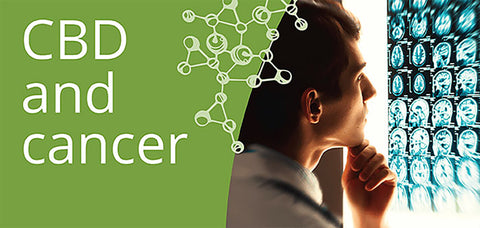Some of these uses have been well known for decades, but new treatments are being formulated all the time, and lately, Medical Doctors are using CBD to treat cancer symptoms, depression, insomnia, and chronic pain among many others.
Despite CBD sometimes seeming like a mysterious cure-all, there is actually a substantial body of evidence growing, which highlights its vast and impactful benefits.
CBD For Cancer

Cancer, characterized by the uncontrollable growth of abnormal cells, is a term that applies to a wide range of diseases.
It’s an all too common part of our lives, with almost everyone knowing someone who’s been directly affected by this disease.
Because there is such a wide range in types of cancers and the places it can manifest, there is an even wider range of symptoms and potential complications.
Some of the most common symptoms include various types of fatigue, dramatic weight changes, persistent unexplained fevers, bruising, muscle pain, and weakness.
Cancer varies in rarity, going from quite rare to incredibly widespread. Overall, cancer is one of the biggest killers in the world.
In 2018 alone, there were close to 20 million new cases identified.
As diagnosis procedures and treatments have progressed, the survival rate of cancer has also increased.
That said, cancer is still one of the most significant causes of preventable death each year, so developing effective treatments that are well tolerated remains very important.
Research has shown that CBD tincture has great potential in treating the symptoms of cancer, as well as the complications of cancer treatment.
CBD For Cancer Research
A study out of the University of Milan, titled Cannabidiol as a potential anti-cancer drug, noted that cannabinoids have the potential to provide therapeutic benefits without the psychoactive effect of other cannabinoids.
This has helped open up research on the ability of CBD oil tincture to impact various stages of cancer.
A 2013 study published in the Journal of Pain and Symptom Management, talks about the long term safety and tolerability of cannabinoids in patients with terminal cancer-related pain.
The study found that CBD benefits may slow the veracity of tumor growth, while also significantly altering the impact of several malignancies.
They also showed CBD oil could help treat cancer-related pain that’s proven to be opioid resistant.
Furthermore, a 2010 study out of the University of Rostock called Cannabidiol inhibits cancer cell invasion via the upregulation of tissue inhibitor of matrix metalloproteinases-1 found that CBD benefits may demonstrate a novel mechanism that could decrease the speed at which invasive cancers spread.
The team identified both CB1 and CB2 receptors, along with the TRPV1, as potential avenues for this mechanism.
Researchers out of the University of Insubria back in 2012 published a report which looked into the ability of CBD oil to reduce tumor size and spread.
Both in vivo and in vitro models showed that CBD oil significantly inhibits angiogenesis and even increased cell-death of cancer cells.
Given how many people cancer impacts, it’s fantastic to see such strong evidence published over the last ten years.
While we still need to study the effect much more, we now have reason to believe CBD benefits could not only help reduce the growth of cancer cells, but it may even directly help kill them off.
Be sure to ask your doctor if adding CBD tincture to you or a loved one’s current treatment plan is a viable option.
CBD For Sleep

Sleep is important, we cannot function without it, and any impact on one's ability to sleep, or to remain awake, will have a notable impact on other aspects of an individual's health and wellness.
There are over 100 different known sleeping disorders, but the most common groups include:
- Insomnia: when an individual cannot sleep.
- Hypersomnia: when an individual has difficulty staying awake despite getting adequate sleep.
- Parasomnia: more commonly known as night terrors, and finally general problems with sleep rhythm.
- Sleep rhythm: which can greatly reduce an individual's ability to maintain a consistent sleep schedule.
These disorders can be either short term or chronic, with some battling these issues for much of their lives.
Sleep disorders are also relatively common, with around 70 million people across the US alone dealing with some form of sleep disorder.
What's worse is that they're currently on the rise, so identifying well-tolerated and effective treatments is becoming increasingly important.
A number of studies have been conducted regarding CBD's effect on sleep.
One such study was conducted in 2008 and titled The nonpsychoactive Cannabis constituent cannabidiol is a wake-inducing agent.
The researchers found that cannabidiol, when applied to specific parts of the brain, was able to successfully increase wakefulness in test subjects.
One of the key areas of the brain noted by researchers was the hypothalamus. A team of researchers working with GW Pharmaceuticals conducted a study on over 2000 subjects in a study titled Cannabis, pain, and sleep.
Studies from therapeutic clinical trials of Sativex, a cannabis-based medicine.
Their results showed that over half of the subjects reported their sleep being good or very good after starting a regimen of a CBD based drug.
Perhaps even more importantly, there was no increased tolerance even after four years of using CBD tincture.
CBD For Sleep Research
A 2006 study out of the National Autonomous University of Mexico identified some of the key neurons affected by the introduction of CBD oil.
For instance, CBD oil was shown to directly impact neurons in the hypothalamus, which increased dopamine levels significantly.
Interestingly, they confirmed CBD could modulate wakefulness, even while increasing the rate of dopamine release in the brain.
Finally, a 2013 report conducted by researchers at the University of Sao Paulo found that CBD products not only increased the total amount of sleep but also greatly reduced the amount of time it took to fall asleep.
Additionally, the team found some early evidence that CBD oil may increase slow-wave sleep.
It seems like every month there is a new pile of peer-reviewed research looking into the impact of CBD oil benefits against on a variety of issues, including sleep disorders.
Thanks to the tireless research, we now know many of the critical ways in which starting a regimen of cannabidiol can improve your sleep.
Not only for insomniacs, but also those who need help staying awake, or those who just don't seem to get restful enough sleep.
Only time will tell how much of a difference CBD oil makes for your sleep disorder, but plenty of people are living proof of the possibilities!
CBD For Depression

Depression is, unfortunately, a widespread medical condition especially among Millenials and Generation X.
It is typically characterized by feelings of worthlessness and intense sadness.
Depression, as a common emotion, often passes after a given amount of time. Clinical Depression, however, lasts for extended periods, ultimately impacting every aspect of an individual’s life.
Symptoms of depression can range wildly from sleeping too much or not sleeping at all.
For some, they will lose their appetite and lose weight, and others will overeat and gain weight.
How an individual reacts to an extended depressive state has more to do with who they are than anything else.
While depression can be brought on by a major stressful life event, it can also be caused by something as complicated as genetics.
With such a wide range of symptoms and causes, it can often feel as if doctors and scientists are only scratching the surface of how to treat it.
Luckily, hemp oil has been increasingly studied as part of an effective treatment plan for depression.
There are many promising studies on CBD’s effectiveness in treating mood disorders.
A 2011 study, conducted at the University of Newcastle upon Tyne, titled Endocannabinoid system dysfunction in mood and related disorders found that the endocannabinoid system has a significant impact on a variety of mood-related disorders.
Further yet, they found that an abnormality in the CB1 receptor, a specific receptor within the endocannabinoid system, correlated with an increased risk for psychiatric disorders.
How CBD Help People With Depression?
Another study conducted by the Federal University of Rio de Janeiro called Antidepressant-like and anxiolytic-like effects of cannabidiol.
A chemical compound of Cannabis sativa found that CBD has anxiolytic-like effects and antidepressant properties.
The researchers were able to show that CBD tincture greatly outperformed control groups during tests designed to induce stress and depressive responses in rat models.
Another study titled The endocannabinoid system and the treatment of mood and anxiety disorders found that both preclinical and clinical data indicate CBD receptors are a viable way to treat psychological disorders.
Moreover, they concluded abnormalities of these receptors increase the risks of developing these disorders.
A 2014 study out of the Medical College of Wisconsin showed CBD activates the CB1R receptor, which is the same mechanism by which most antidepressants work.
This made them much more confident in the potential of CBD as a genuine antidepressant.
While we still need a lot more research until we can say much for certain, there’s a lot to be excited about when it comes to CBD’s impact on depression.
Not only has it been shown to improve overall mood on a day-by-day basis, but it even proves useful during extremely stressful situations that are known to exacerbate depression.
Be sure to talk to your doctor if you have any questions about adding CBD gummies to your current treatment plan.

